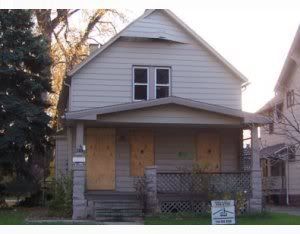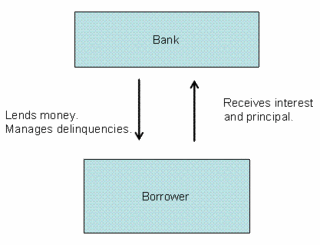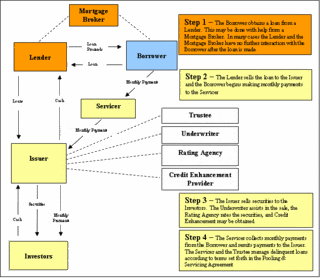The County Auditor’s database says the owner of this house is Deutsche Bank National Trust Company. It says Deutsche Bank NTC paid $50,000 for the house in a sheriff’s sale in March 2007. The sheriff’s sale was the outcome of Case CV-05-554639, an action for foreclosure against the previous owners, filed in Common Pleas Court in February 2005 by Deutsche Bank NTC “as Trustee”.
But Deutsche Bank never held a mortgage on 4111 Archwood. And Deutsche Bank doesn’t really own 4111 Archwood now.
We’ll get back to Case CV-05-554639 and that magic word “Trustee” in a minute. But first, a short tour of the New Mortgage Industry, courtesy of the Chairman of the Federal Deposit Insurance Corporation, Sheila Bair.
Chairman Bair testified before the U.S. House Committee on Financial Services last April. Her entire testimony is well worth reading, but it’s modestly famous for two charts.
The first chart depicts the mortgage transaction as many (most?) of us still understand it:
Simple. Straightforward. Ancient history.
Here’s Chairman Bair’s second chart, “Borrowing Under a Securitization Structure”, depicting the typical mortgage transaction in 2007 (click to enlarge):
As Chairman Bair explained to the Committee:
Securitization takes the role of the lender and breaks it into separate components. Unlike the more traditional relationship between a borrower and a lender, securitization involves the sale of the loan by the lender to a new owner–the issuer–who then sells securities to investors. The investors are buying “bonds” that entitle them to a share of the cash paid by the borrowers on their mortgages. Once the lender has sold the mortgage to the issuer, the lender no longer has the power to restructure the loan or make other accommodations for its borrower. That becomes the responsibility of a servicer, who collects the mortgage payments, distributes them to the issuer for payment to investors, and, if the borrower cannot pay, takes action to recover cash for the investors.And she listed some of the roles in this modern mortgage transaction:
“Bankruptcy-remote”. What a great adjective.
- Issuer – A bankruptcy-remote special purpose entity (SPE) formed to facilitate a securitization and to issue securities to investors.
- Lender – An entity that underwrites and funds loans that are eventually sold to the SPE for inclusion in the securitization. Lenders are compensated by cash for the purchase of the loan and by fees. In some cases, the lender might contract with mortgage brokers. Lenders can be banks or non-banks.
- Mortgage Broker – Acts as a facilitator between a borrower and the lender.The mortgage broker receives fee income upon the loan’s closing.
- Servicer – The entity responsible for collecting loan payments from borrowers and for remitting these payments to the issuer for distribution to the investors. The servicer is typically compensated with fees based on the volume of loans serviced. The servicer is generally obligated to maximize the payments from the borrowers to the issuer, and is responsible for handling delinquent loans and foreclosures.
- Investors – The purchasers of the various securities issued by a securitization. Investors provide funding for the loans and assume varying degrees of credit risk, based on the terms of the securities they purchase…
- Trustee – A third party appointed to represent the investors’ interests in a securitization. The trustee ensures that the securitization operates as set forth in the securitization documents, which may include determinations about the servicer’s compliance with established servicing criteria.
So what does this all have to do with 4111 Archwood? While I explain, you might want to keep that second chart handy.
In August 2003, the couple that had owned 4111 Archwood since 1996 refinanced it for $93,500. Their lender was Argent Mortgage Company, LLC, a division of ACC Holdings of Orange, CA, which also owned Ameriquest Mortgage and AMC Mortgage Services. Argent was the biggest single subprime lender in Cuyahoga County between 2003 and 2005, going from no originations in 2002 to nearly 2,400 in 2003, 4,900 in 2004, and 3,800 in 2005. (Following several years of lawsuits and other problems, ACC recently closed Ameriquest’s doors and sold Argent, AMC and Ameriquest’s servicing contracts to Citigroup. Argent is now doing business as Citi Residential Lending.)
Less than two months after the mortgage on 4111 Archwood was signed, Argent Mortgage Co. LLC transferred it to Argent Securities, Inc., which “deposited” it, along with thousands of other Argent mortgages into something called “Argent Securities, Inc. Asset-Backed Pass-Through Certificates Series 2003-W5″.
Let’s just call it “ASIABPTCS2003W5″ for short.
As you may have guessed, ASIABPTCS2003W5 is one of those “bankruptcy-remote special purpose entities” Chairman Bair mentioned. It was set up by Argent to be the vehicle by which all that mortgage paper, with a face value of $1.5 billion, would be sold to investors. Once that was accomplished, the mortgage on 4111 Archwood became a tiny piece of the paper assets owned by ASIABPTCS2003W5, a corporate entity owned not by Argent but by its investors.
The “Pooling and Service Agreement” that created ASIABPTCS2003W5 named Argent’s sister company, Ameriquest Mortgage, as “Master Servicer” for all those mortgages.
And it named Deutsche Bank National Trust Company as the “Trustee” of ASIABPTCS2003W5 — the party paid to represent the interests of the investors and oversee the Master Servicer’s performance.
This all happened at the beginning of October, 2003.
Sixteen months later, in February 2005, the borrower was in default and Deutsche Bank — as the Trustee for ASIABPTCS2003W5 — filed an action for foreclosure in Common Pleas Court.
But — funny thing — nobody had bothered to tell the County Recorder, who’s legally in charge of keeping track of these things, that Argent Mortgage had sold the mortgage to ASIABPTCS2003W5. Ten months into the foreclosure proceeding, the magistrate somehow figured out that Argent was still the mortgagee of record and that Deutsche Bank lacked standing to foreclose on the property. (As the case summary, entry for 12/21/05, puts it: “PLAINTIFF’S MOTION TO VACATE CASE AND PLACE ON THE ACTIVE LIST IS DENIED. THE PARTY PURPORTEDLY GRANTED RELIEF FROM STAY IS NOT THE PLAINTIFF IN THIS ACTION.”)
The lawyer for Deutsche Bank quickly filed a motion to make Argent the “substitute plaintiff” in the case. The magistrate agreed to this, putting the foreclosure back on track. Then Argent’s lawyer got it together to file the correct document — it’s called a “Release Assignment” — with the Recorder’s Office in February, confirming the sale of the mortgage on 4111 Archwood to, ahem…
“DEUTSCHE BANK NATIONAL TRUST COMPANY AS TRUSTEE OF ARGENT SECURITIES INC., ASSET BACKED PASS THROUGH CERTIFICATES SERIES 2003-W5 UNDER THE POOLING AND SERVICING AGREEMENT DATED AS OF OCTOBER 1, 2003″Finally, seven months later — after the foreclosure was granted to substitute plaintiff Argent, which had sold off its interest in the mortgage three years earlier — the magistrate granted a second plaintiff substitution, swapping Argent out and “Deutsche Bank National Trust Company as Trustee of ASIABPTCS2003W5″ back in.
So it was “Deutsche Bank National Trust Company as Trustee of ASIABPTCS2003W5″ listed as plaintiff on the sheriff’s sale notice, and as the grantee (buyer) on the sheriff’s deed. And now it’s “Deutsche Bank National Trust Company” listed as the owner on County records — with a tax mailing address at 505 City Parkway Suite # 100, Orange, CA, which just happens to be the last-listed address of Ameriquest Mortgage. (Remember them? Master Servicer for ASIABPTCS2003W5. Now defunct. Mortgage servicing contracts bought by Citigroup.)
But of course Deutsche Bank NTC doesn’t actually own 4111 Archwood, any more than it actually ever owned the mortgage.
ASIABPTCS2003W5 — that “bankruptcy-remote special purpose entity”, a paper creation owned by nobody in particular — owns 4111 Archwood.
Deutsche Bank, as Trustee, just represents ASIABPTCS2003W5 for certain purposes. Ameriquest Mortgage was supposed to take care of ASIABPTCS2003W5′s properties, but Ameriquest is out of business; this job may have passed to Citi Residential.
So who’s actually responsible for 4111 Archwood? Good question.
That’s just one house. Deutsche Bank currently “owns” over 900 houses in Cuyahoga County through foreclosures in which it acted as Trustee for some “special purpose entity”, commonly an entity created by Argent. Argent alone organized at least thirty-one of these billion-dollar mortgage-backed investment pools from 2003 through 2006.
So maybe you can see why Judges Boyko, O’Malley, Rose, et al are making a big deal about checking Deutsche Bank’s paperwork.



No comments :
Post a Comment